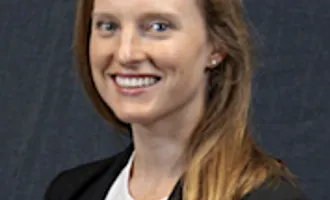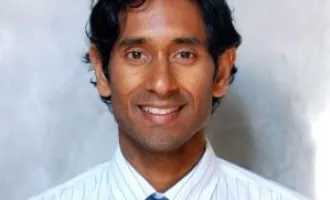Life of a Grad Student: Second Year
Student 1, Male, Parnassus
Tell us about your experience at UCSF so far.
UCSF has a welcoming environment, and they encourage students to leave our mark on the campus, academically and socially. I’ve had a lot of opportunities to get involved with extracurriculars and interact with faculty. There are always a lot of things to do, especially at Parnassus.
What about your lab experience? How did you choose your lab?
Great overall — I’ve gotten a lot of support from members of my lab. My lab is made up of about 10 people, specialists who are good mentors, as well as a few of my peers. I’ve worked in smaller labs where it was just the PI, and I didn’t have much guidance but learned to be very independent.
I have a lot of peers in larger labs, where there’s more camaraderie, but it can get overwhelming, because the PI has a lot of other things on their plate. I think I’m in a good place for me.
Is it different from what you initially expected? How?
I think I expected the PhD to be more straightforward. I came in thinking it was all about getting a project done, publishing and moving onto the next step. But things haven’t come as easily.
I didn’t have much experience coming in, and I think that made it difficult to know how to reach out. I was struggling spending so many hours in lab and not getting anywhere, and wondered: Am I the only one in this situation?
How did you deal with these challenges?
I learned that I had to work more. I worked in industry before, and in that environment, people come in at 9 or 10 a.m. and leave by 6 p.m., and that’s it. Here, it doesn’t quite stop there; once you go home, there’s more time to get work done.
It’s an evolving process to keep pushing, because if you don’t do the work yourself, no one’s going to do it for you. To really be successful in research, you need to put in the time to get things done, and because I wasn’t doing that, I think it was hindering my progress.
Can you tell us about your quals experience?
There hasn’t been much direction at times. It’s like: I have this project, so is it time to go find my quals committee, or is this a more dynamic process, or is this separate from my dissertation? It’s important to have a starting point that you feel good about. Going to the library has helped.
What are you still working on?
Knowing how much time things should take and still leaving time to de-stress or do the things I enjoy.
I think part of the PhD process is learning how to manage your time well. Sometimes you’ll have to learn that on your own, and that’s fine — the whole point is to be independent and know when you can do things on your own and when you need assistance from your lab or other people in your program.
What advice would you give other students?
Pick a lab environment that you will enjoy for the next few years, and be OK with the nuances of that lab. The project is not as important. It’s important that it’s interesting to you, but in the big picture, if you’re not having a good time in your lab or aren’t getting the support you need, you’re going to struggle with the PhD.
Student 2, Male, Mission Bay
Tell us about your experience at UCSF so far.
At first, I was so professional, 9-5. I felt like a kid, because there were so many “adults,” with families. But I like the separation you get because of that — you go home and you don’t think about it. And UCSF takes care of their grad students. We’re spoiled because we don’t have undergrads.
What about your lab experience? How did you choose your lab?
A lot people feel like whatever choice you make is going to affect the rest of your life, which is true, but there really is no right choice. If you feel like, “This is OK,” just go for it. It’s a choice like any other choice, so you shouldn’t worry so much.
The way I went about it was I made a list, and I was like, “This professor has these pros and these cons, “ and then I went with the professor with the most pros over cons.
Is it different from what you initially expected? How?
My lab is pretty good, but there are lots of challenges, more personal than scientific. One of the challenges is having a boss. It’s a different skill set and more about learning to deal with people.
For example, things don’t work, and the boss says, “You just have to work harder, work harder every day.” I worked harder, but then I realized it just takes time.
Another challenge is the uncertainty of graduation. A lot of my friends say that they’ve been promised four or five years [before graduation]. Personally, I always think, “How many years before I quit?” [Laughter.]
The way I think about it is that I’m not doing a PhD because I want a degree. I just think it should be a part of my life.
How did you deal with these challenges?
Sometimes the boss tells me to do something and expects me to just do it. There’s tension, because how much do you do when you disagree with your boss? But I learned to clarify his perspective, so in very simple words: communication.
Also, I learned to relax more. This probably comes from working as hard as my PI wanted for a year and realizing that it did not get me any farther. I’m pretty sure if I hadn’t worked that hard, I would still be where I am now.
You start doing experiments just to look like you’re working hard, but sometimes you need to process and digest. Some things just don’t go faster, and thinking about it will just mess up your life.
Can you tell us about your quals experience?
One thing that really helped me was choosing a committee that liked me — rather than big shots who are really famous. My qualifying exam was less of a test and more like they were just trying to help me, and it was a really positive experience.
What are you still working on?
I like every day of my life to be meaningful, which means that if a three-day weekend is coming up, I want to go camping or something. My PI usually says it’s OK, but I still struggle because it’s like, “Oh no, I’m taking time off again.”
I feel terrible and lazy, especially because he keeps saying, “The key to grad school is to work hard. You just have to keep doing experiments.” I took that to heart at first, and now I’m reconsidering it. And everyone seems to be different.
Some people don’t take time off, and they’re OK with it, or they seem to be. So it’s an internal struggle — I’m trying to find a balance.
What advice would you give other students?
Grad school is a slow process, so don’t try to rush. Just relax, and don’t worry so much about your end destination, because things can and do change a lot.
Editor's Note: Although no two grad experiences are identical, there are many common threads that simply aren’t verbalized. In this new "Life of a Grad Student" column, we hope to illuminate some of these similarities. Grad students from all walks of life and all stages of their education have agreed to anonymously, candidly speak with us. They’ve shared stories about the difficulties they’ve encountered as well as the great passions driving their work. We hope to highlight the incredible people working in UCSF laboratories.



